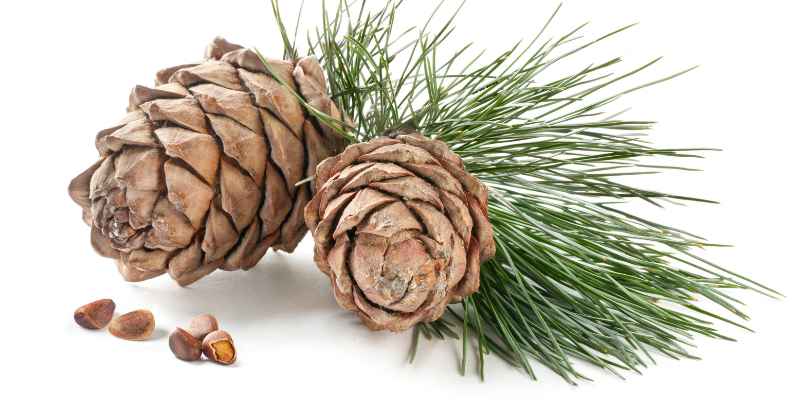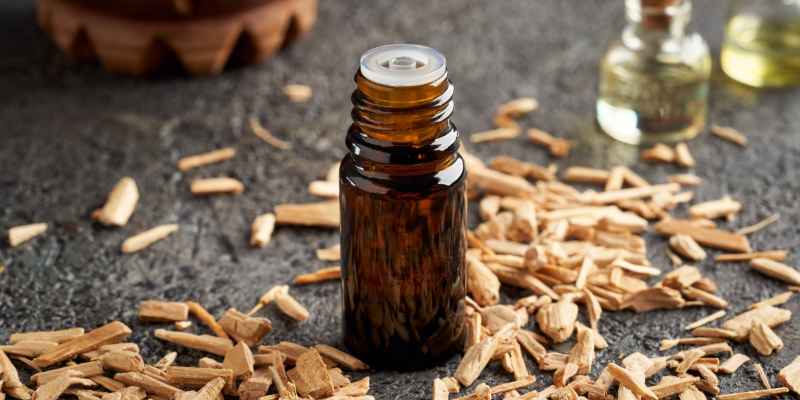Cedar smells good due to the compound thujaplicin present in the wood. This compound creates the pleasant aroma.
The aromatic scent of cedar is beloved by many for its warm and earthy notes that evoke feelings of comfort and relaxation. Cedar’s distinctive fragrance comes from a compound called thujaplicin, which not only imparts the delightful scent but also serves as a natural insect repellent.
Whether used in perfumery, home decor, or aromatherapy, cedar’s inviting aroma adds a touch of nature’s beauty to any setting. Discover why cedar is more than just a pleasant fragrance, as we delve into the intriguing world of this timeless and cherished scent.
The Essence Of Cedar‘s Charm
The essence of cedar’s charm lies in the compound thujaplicin found in the wood. While the scent may fade over time, sanding can restore its insect-repelling aroma. Cedarwood is also a popular fragrance in perfumery, adding a warm and earthy element to scents.
Cedar wood‘s delightful scent is a result of its unique compounds. The aromatic essence of cedar not only pleases the senses but also serves practical purposes. Let’s delve into the science behind cedar’s captivating fragrance.
The Compounds Behind Cedar’s Scent
Cedar’s aromatic allure can be attributed to compounds such as cedrol, cedrene, and thujopsene. These natural elements contribute to the rich and pleasant scent that cedar emits.
Cedrol And Thujopsene: Nature’s Perfumery
Cedrol and thujopsene are the stars of cedar’s fragrance profile. Cedrol offers a subtly sweet aroma, while thujopsene adds depth and complexity to the overall scent experience. Together, these compounds create a symphony of fragrance that is both alluring and soothing.
In conclusion, the enchanting scent of cedar is a result of nature’s perfumery at its finest. The combination of cedrol and thujopsene elevates cedar wood to a realm of olfactory delight, making it a cherished aroma in perfumery and beyond.

Cedar In Culture And History
The delightful scent of cedar is due to the presence of the compound thujaplicin, not just for its aroma. Over time, the fragrance may diminish but can be revived by sanding the wood. Cedarwood adds a warm, earthy element to fragrances, offering a timeless and soothing aroma.
Historical Uses Of Cedar Aroma
Cedar has been revered for its aromatic properties throughout history. It has been used in various ways, from practical applications to spiritual rituals. Let’s explore the historical uses of cedar aroma:
- Building Materials: Cedar wood was commonly used in construction due to its durability and resistance to decay. The pleasant scent of cedar also acted as a natural insect repellent, making it an ideal choice for building structures.
- Medicinal Purposes: Cedar oil was used in traditional medicine for its therapeutic properties. It was believed to have antiseptic, antifungal, and anti-inflammatory qualities, making it beneficial for treating various ailments.
- Perfumes and Fragrances: The sweet and woody aroma of cedar has made it a popular ingredient in perfumes and fragrances. Its scent is often described as warm, earthy, and soothing, adding depth and complexity to fragrance compositions.
- Spiritual and Ritualistic Uses: Cedar has held significant cultural and spiritual importance in many civilizations. It was believed to possess purifying and cleansing qualities, used in rituals to ward off negative energy and promote spiritual well-being.
Cedar’s Significance Across Civilizations
The significance of cedar extends beyond its aroma. It has played a prominent role in various civilizations, symbolizing different concepts and values. Let’s explore how cedar has been revered across cultures:
| Civilization | Symbolism |
|---|---|
| Ancient Egyptians | Cedar was associated with immortality and used in the embalming process. It was also believed to be a symbol of protection and purification. |
| Native American Tribes | Cedar was considered a sacred tree, often used in ceremonies and rituals. It represented strength, resilience, and connection to the spiritual realm. |
| Chinese Culture | Cedar was associated with longevity and used in traditional Chinese medicine for its healing properties. It symbolized vitality and harmony. |
| European Folklore | Cedar was believed to have protective qualities, guarding against evil spirits and negative influences. It was also associated with abundance and prosperity. |
From ancient civilizations to modern times, cedar has captivated people with its alluring scent and cultural significance. Its aroma continues to evoke feelings of comfort, tranquility, and connection to nature.
Cedar’s Aromatic Profile
Cedar’s unique and captivating scent has intrigued and delighted many for centuries. The aromatic profile of cedar is a harmonious blend of earthy, woody, and sweet notes, creating a fragrance that is both comforting and invigorating. This distinctive aroma is attributed to the presence of specific chemical compounds, which give cedar its signature scent.
Describing Cedar’s Unique Scent
Cedar’s scent is often described as warm, woody, and slightly sweet, with hints of resinous and balsamic undertones. The aroma is reminiscent of the great outdoors, evoking images of towering cedar trees and the natural essence of the forest. This inviting fragrance is often used in perfumery, aromatherapy, and home products to impart a sense of tranquility and serenity.
The Evolving Notes Of Cedar Aroma
The aroma of cedar evolves over time, starting with fresh, vibrant notes that gradually mellow into a rich, deep fragrance. Initially, the scent may be sharp and energetic, reminiscent of freshly cut wood, but as it ages, the aroma becomes warmer and more complex, exuding a sense of timeless elegance.
Health And Wellness Benefits
The captivating aroma of cedar is not only a treat for the senses but also offers remarkable health and wellness benefits. From stress relief to enhancing cognitive function, the scent of cedarwood holds incredible therapeutic potential.
Cedarwood In Aromatherapy
The use of cedarwood in aromatherapy has gained immense popularity due to its numerous health benefits. The essential oil derived from cedarwood is known for its calming and grounding properties, making it an ideal choice for promoting relaxation and tranquility. When diffused, the aromatic compounds in cedarwood can create a serene ambiance, fostering a sense of peace and well-being.
Stress Relief And Cognitive Benefits
Cedarwood essential oil is renowned for its ability to provide stress relief and mental clarity. Inhaling the aroma of cedarwood can help reduce anxiety and promote relaxation, thereby alleviating the pressures of daily life. Furthermore, the scent of cedarwood is believed to enhance cognitive function, improving focus and mental acuity.
Cedar In The Animal Kingdom
Cedar in the animal kingdom carries a pleasant scent due to the presence of thujaplicin, a natural compound. This aromatic feature serves as a defense mechanism against insects and fungal growth, making it an essential element for the survival of cedar trees in their natural habitat.
Natural Repellent Properties
In the animal kingdom, cedar is highly valued for its natural repellent properties. The strong scent of cedar acts as a deterrent against insects and pests, making it a popular choice for creating natural barriers in the wild. This protective quality helps animals ward off unwanted visitors and maintain a safe environment in their habitats.
Cedar’s Role In Ecosystems
Cedar plays a crucial role in ecosystems by promoting biodiversity and supporting wildlife. As a scented barrier, cedar trees protect various species from predators and unfavorable conditions, creating a harmonious balance within the ecosystem. Additionally, the natural compounds in cedar contribute to the overall health of the environment by deterring harmful pests and encouraging the growth of beneficial organisms.
By understanding the significance of cedar in the animal kingdom, we can appreciate its integral role in maintaining the balance of natural ecosystems.
Cedarwood In Perfumery
Cedarwood in perfumery is prized for its delightful scent, attributed to the compound thujaplicin. This natural aroma adds a warm, earthy element to fragrances and is known for its soothing and calming qualities. Additionally, cedarwood essential oil is used in aromatherapy to deodorize indoor spaces and repel insects, making it a versatile and highly valued ingredient in the world of perfumery.
Cedarwood has been used in perfumery for centuries due to its unique and pleasant aroma. The scent of cedarwood is warm, earthy, and woody, making it a popular choice for many perfumers. But what makes cedarwood such a sought-after fragrance note in the perfume industry? Let’s explore.
Blending Scents With Cedar
One of the reasons cedarwood is used in perfumery is because it blends well with other fragrance notes. Its warm and woody aroma pairs well with floral scents, musk, and citrus fragrances. In fact, cedarwood is often used as a base note in perfumes to provide a warm and comforting scent that lasts throughout the day.
Cedar’s Longevity In Fragrances
Another reason cedarwood is popular in perfumery is its longevity. Cedarwood has a natural ability to hold onto scent molecules, making it an ideal choice for perfumes that are designed to last for hours. Many perfumers use cedarwood as a base note in their fragrances to anchor the scent and provide a long-lasting aroma.
In addition to its unique scent and longevity, cedarwood has other benefits in perfumery. It is a natural insect repellent, which is why it is often used to line drawers and closets. Cedarwood also has a calming effect on the mind, making it a popular choice in aromatherapy.
In conclusion, cedarwood is a versatile fragrance note that has been used in perfumery for centuries. Its warm and woody aroma blends well with other fragrance notes and provides a long-lasting scent that is both comforting and calming.
Maintaining The Aroma Of Cedar
There’s something undeniably comforting about the rich, woody scent of cedar. Whether it’s the fragrance of a cedar chest, the aroma of freshly cut cedar wood, or the lingering smell of cedar essential oil, the distinct scent of cedar is cherished by many. However, to ensure that the delightful aroma of cedar endures, it’s important to take steps to preserve it. Let’s explore how you can extend the life of cedar’s smell and some DIY tips for cedar scent preservation.
Extending The Life Of Cedar’s Smell
Over time, the aromatic allure of cedar can diminish, but there are methods to help maintain its captivating scent. One effective way to prolong the fragrance of cedar is by sanding the wood to revive its natural oils and release the aromatic compounds. Regularly sanding the cedar surface can help to refresh its scent and extend the lifespan of its delightful fragrance.
Diy Tips For Cedar Scent Preservation
Preserving the invigorating scent of cedar can be achieved through simple do-it-yourself techniques. Placing cedar blocks or sachets in closets, drawers, or storage spaces can help to infuse the surroundings with the captivating aroma of cedar. Additionally, applying a thin layer of cedar oil or reinvigorating cedar spray to the wood’s surface can help to revive and maintain its alluring scent.

Cedar In Modern Living
Cedar has been a cherished natural element in human living for centuries, and its enchanting aroma continues to make it a popular choice in modern living. The distinct scent of cedar has found its way into contemporary design and innovative applications, adding a touch of nature’s goodness to our everyday lives.
Cedar’s Place In Contemporary Design
The timeless appeal of cedar has made it a sought-after material in contemporary design. Its rich, warm scent and natural beauty make it a popular choice for interior decor, furniture, and architectural elements. The use of cedar brings a sense of tranquility and connection to nature, enhancing the modern living spaces with its distinctive aroma.
Innovative Uses Of Cedar Aroma Today
Besides its traditional uses, the aromatic cedar scent has found innovative applications in modern living. From scented candles and essential oils to fragrant home products, cedar’s captivating aroma is now a staple in the wellness and lifestyle industry. Its calming and soothing properties make it a popular choice for aromatherapy and relaxation, adding a touch of natural luxury to contemporary living spaces.
Frequently Asked Questions
Why Does Cedar Smell Good?
Cedar wood smells good because it contains a compound called thujaplicin. This compound is responsible for the pleasant aroma of cedar. The smell may vary depending on the strength of the scent in the wood and can be restored by sanding the wood’s surface.
Cedarwood is also used in fragrances for its warm and earthy scent.
How Long Does The Smell Of Cedar Last?
The smell of cedar can last for years, but may fade over time. Sanding the wood can restore its aroma.
Is Cedar Wood A Good Scent?
Yes, cedar wood is a good scent. The reason why cedar wood smells good is because it contains the compound thujaplicin. Cedarwood adds a spicy, warm, and earthy element to fragrances, and it’s a timeless scent that can be soothing and calming to the senses.
It is also known for its insect-repelling properties and can be used in aromatherapy applications.
What Does Cedar Scent Do?
Cedar scent is known for its aromatic properties and is often used in aromatherapy. It has a soothing and calming effect on the body and mind. Cedarwood essential oil is also used to deodorize indoor spaces, repel insects, prevent mildew, improve concentration, and reduce stress.
The pleasant smell of cedar is due to the compound thujaplicin found in cedar wood.
Conclusion
The enticing smell of cedar wood can be attributed to the compound thujaplicin it contains. This natural fragrance adds a touch of warmth and earthiness to perfumes and can create a calming and soothing atmosphere. While the aroma may fade over time, sanding the wood can restore its aromatic properties.
Whether used in fragrances or as a natural insect repellent, cedar’s delightful scent continues to captivate our senses.


